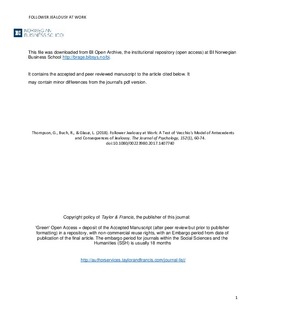| dc.contributor.author | Thompson, Geir | |
| dc.contributor.author | Buch, Robert | |
| dc.contributor.author | Glasø, Lars | |
| dc.date.accessioned | 2018-02-27T13:30:49Z | |
| dc.date.available | 2018-02-27T13:30:49Z | |
| dc.date.created | 2017-11-21T17:19:12Z | |
| dc.date.issued | 2017 | |
| dc.identifier.citation | Journal of Psychology. 2017, 152 (1), 60-74. | nb_NO |
| dc.identifier.issn | 0022-3980 | |
| dc.identifier.uri | http://hdl.handle.net/11250/2487410 | |
| dc.description.abstract | The present study tests the validity of Robert P. Vecchio's seminal work on antecedents and consequences of jealousy. Specifically, we examine whether antecedents such as in-group status, supervisory considerateness, and supervisory differentiation of subordinates are associated with jealousy. In addition, we examine whether jealousy is associated with the outcome variable of social loafing. Leaders (n = 73) and their followers (n = 303) working in business organizations in Norway contributed data. Multilevel analyses showed that a high-quality working relationship with one's supervisor was inversely related to reports of jealousy. In addition, supervisors who displayed high levels of considerateness, for example, by providing followers with positive emotional support, were better able to reduce subordinate jealousy. This is a novel observation since previous research failed to demonstrate such a relationship. Finally, jealousy was positively associated with social loafing, suggesting that jealous followers engaged in an active counterproductive resistance response. The present study contributes to the extant literature by identifying unexamined antecedents of jealousy and a dysfunctional behavioral response to jealousy in the form of social loafing in the workplace. | nb_NO |
| dc.language.iso | eng | nb_NO |
| dc.publisher | Taylor & Francis | nb_NO |
| dc.title | Follower jealousy at work: A test of Vecchio’s model of antecedents and consequences of jealousy | nb_NO |
| dc.type | Journal article | nb_NO |
| dc.type | Peer reviewed | nb_NO |
| dc.description.version | acceptedVersion | nb_NO |
| dc.rights.holder | Copyright policy of Taylor & Francis, the publisher of this journal: 'Green' Open Access = deposit of the Accepted Manuscript (after peer review but prior to publisher formatting) in a repository, with non-commercial reuse rights, with an Embargo period from date of publication of the final article. The embargo period for journals within the Social Sciences and the Humanities (SSH) is usually 18 months | nb_NO |
| dc.source.pagenumber | 60-74 | nb_NO |
| dc.source.volume | 152 | nb_NO |
| dc.source.journal | Journal of Psychology | nb_NO |
| dc.source.issue | 1 | nb_NO |
| dc.identifier.doi | 10.1080/00223980.2017.1407740 | |
| dc.identifier.cristin | 1516872 | |
| dc.description.localcode | 1, forfatterversjon | nb_NO |
| cristin.unitcode | 158,4,0,0 | |
| cristin.unitname | Institutt for ledelse og organisasjon | |
| cristin.ispublished | true | |
| cristin.fulltext | original | |
| cristin.fulltext | postprint | |
| cristin.qualitycode | 1 | |
